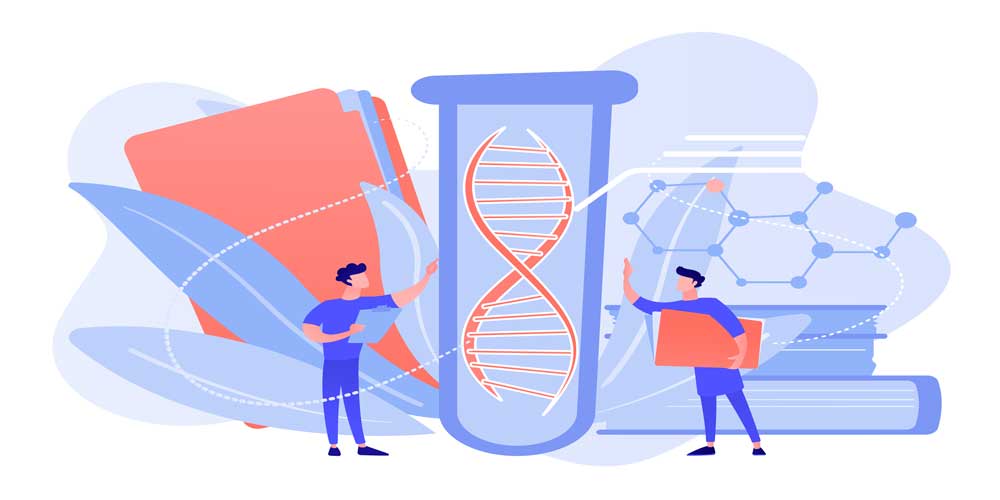
This can be the question of so many people who may have some concerns for their future baby.
When you focus on family members, you can see that children usually suffer from the same disease just like other family members or relatives. When a particular disease runs in the family, the children are more likely to inherit them or at least they have higher risks because the human genetic disorders can pass on from the parents to the children when they are born.
Genetic disorders in humans happens because of DNA irregularities. These disorders cannot be cured but they can be prevented. Genetic disorders in children can lead to death among infants, so that 20% of infants’ deaths are due to genetic diseases.
Every parent wants their kids to be healthy, but many of them are shocked by giving birth to a baby with a genetic disorder. Parents are usually healthy but when two of them have a slight mutation in the same gene, then they have high risk of giving birth to a child with a genetic abnormality.
Despite of these potential risks, you do not need to be concerned about that. By the advancement of fertility treatments, there are some ways to identify future abnormalities of the embryo and remove them in the early stages. In this article, we are going to talk about these methods and how they work in order to prevent genetic disorders before embryo implantation.
Quick Information | ||||
|---|---|---|---|---|
Cost | Anesthesia | Duration of procedure | Hospital Stay | Minimum Stay in Iran |
6000$(IVF+PGD) | Local | 3-4 weeks | Zero day | 3-4 weeks |
Genetic disorders can appear in a child due to genetic abnormalities like having an extra chromosome or a gene mutation. Today, the effects of genetic abnormalities can be predicted by the modern health technologies. Predicting the potential disorders help physicians detect abnormalities and treat them in order to prevent future diseases in the child. Although existences of genetic disorders are not common, some of them can occur more than the others. Below, we discuss about the most common genetic disorders and their symptoms.
Preimplantation Genetic Diagnosis (PGD) or Preimplantation Genetic Testing (PGT) is a kind of reproductive technology which is used to increase the chances of having a successful pregnancy and giving birth to a healthy baby through the use of IVF process.
Fertility doctors do PGD because of two important reasons. One of the important reasons is finding the genetic abnormalities that leads to an unsuccessful IVF process by having a failed implantation or miscarriage. The other one is identifying genetic defects that can cause a genetic disorder in a child or leads to their death after they are born. PGD technology helps embryologists to find flaws during early stages and remove them before the embryo is transferred into the mother’s uterus. (IVF+PGD)

PGD is a very useful technology in fertility treatment. Some patients need to consider doing this technology before having a pregnancy including:
This technology is not only for those who have concerns about their genes, but also can be used by whoever wants to make sure about the health of their baby and choose the embryos who are more likely to be genetically healthy.
Preimplantation genetic diagnosis (PGD) can happen during in vitro fertilization (IVF). This process is optional but sometimes when parents have concerns about the genetic abnormalities, it is recommended to go through PGD too. After an embryo or embryos are created through IVF process, there are some steps that need to be done.
in this process, a few cells are retrieved from the embryos in order to have a test on them. This process is usually done between days 5-7 of embryo growth which is named blastocyst stage. The embryologist removes about 5 cells from the outside layer of the embryos which does not impact its development. Then the cells are tested in a genetics laboratory for about 10-14 days.
while they are waiting for the test result, the embryos are frozen by a flash freezing technology. By freezing the embryos, their quality can be maintained for almost 100%
after getting the results from the genetics laboratory, they can move on to the next step by choosing one of the healthy embryos. The selected embryo is thawed in the laboratory and then implanted into the uterus to hopefully grow into a healthy pregnancy.
In previous years, the biopsy stage was done on the third day of embryo development when the embryo faced some risks because of bad timing and having few cells on the day 3. Today this stage is done between days 5-7 when the fetus has more than 100 cells. As it was discussed, the sample cells are taken from the outside layer so that the biopsy stage does not have any harm to the embryo.
By screening the embryos for genetic abnormalities, the chances of having a miscarriage can decrease significantly. One study showed that PGD can reduce the miscarriage rates in all the ages. For instance, PGD reduced the miscarriage rate from 43% to about 17% among mothers who are 43.
PGD can also increase the chance of pregnancy on the first IVF attempt so that it can save your money and time and prevent the emotional disappointments. In the other words, PGD can lead to more efficient IVF process.
For more information,You may like to read :


Comments & Questions